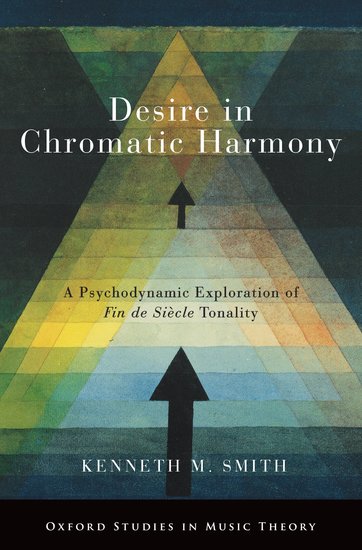Desire in Chromatic Harmony: A Psychodynamic Exploration of Fin de Siecle Tonality
Desire in Chromatic Harmony (2020) is a book by music theorist, Kenneth Smith (University of Liverpool).

Pre-order from Oxford University Press.
Currently available as E-book from Amazon.
|
"Kenneth Smith's scintillating new book is the best kind of interdisciplinary work: psychoanalysis becomes not a goal of music theory here, but its drive, the engine for a real adventure in concept-making. It rewards the mind but also the ears, which cannot hear this endlessly beguiling repertoire in the same way afterwards. A rabbit-hole of a good read!"
Seth Brodsky, Associate Professor of Music, University of Chicago |
"In Desire in Chromatic Harmony, Kenneth Smith explains the unexplainable. And does so in compelling readable prose. Lying at the intersection of psychology, critical theory, philosophy, music theory, and historical musicology, Smith invites the reader into an in-depth yet unassuming contemplation of complicated music-analytical themes - through the chromaticism of Ives, Copland, Szymanowski, Strauss, Suk and Skryabin - from the 19th century right up to today. Something of a post-poststructuralist account of the philosophy of desire in music through the useful psychoanalytic notion of psychodynamics, Smith's incisive work will surely be required reading for all in the music academy, and beyond. In short, a great read."
Philip Ewell, Associate Professor, Hunter College
|
"In this simultaneously psychodynamic and music-theoretical discussion of the Oedipal triangle of Tonic, Subdominant, and Dominant functions in fin-de-siecle music, Kenneth Smith offers a potent new theory of how late tonal music played its part in the development of modern concepts of psychological desire. Scintillating, challenging, and always engagingly written, this book makes a decisive contribution to our understanding of the libidinal landscape of musical modernity."
J. P. E. Harper-Scott, Professor of Music History and Theory, Royal Holloway, University of London |
|
Of the many composers in the Western classical tradition who celebrated the marriage between psyche and sound, those explored in this book followed the lines diverging from Wagner in philosophizing the nature of desire in music.
This books offers two new theories of tonal functionality in the music of the first half of the twentieth century that seek to explain its psychological complexities. First, the book further develops Riemann's three diatonic chord functions, extending them to account from chromatic chord progression and substitution. The three functions (Tonic, Subdominant, Dominant) are compared to Jacques Lacan's twin-concepts of metaphor and metonymy which drive the human desiring apparatus. Second, the book develops a technique for analysing the "drives" that pull chromatic music in multiple directions simultaneously, creating a libidinal surface that mirrors the tensions of the psyche found in Schopenhauer, Freud and post-Freudians, Lacan, Lyotard, and Deleuze.
The harmonic models are tested in psychologically challenging pieces of music by post-Wagnerian composers. From the obsession with death and mourning in Josef Suk's Asrael Symphony to an exploration of "perversion" in Richard Strauss's Elektra; from the post-Kantian transcendentalism of Charles Ives's Concord Sonata to the "Accelerationism" of Skryabin's late piano works; from the Sufi mysticism of Szymanowski's Song of the Night to the failed fantasy of the American dream in Aaron Copland's The Tender Land, the book cuts a path through the dense forests of chromatic complexity, and digs deep into the psychological make-up of post-Wagnerian psychodynamic music.
|
|
|
|



